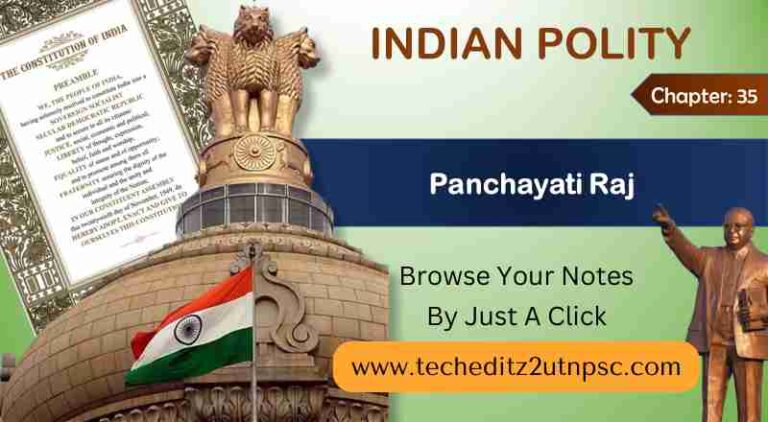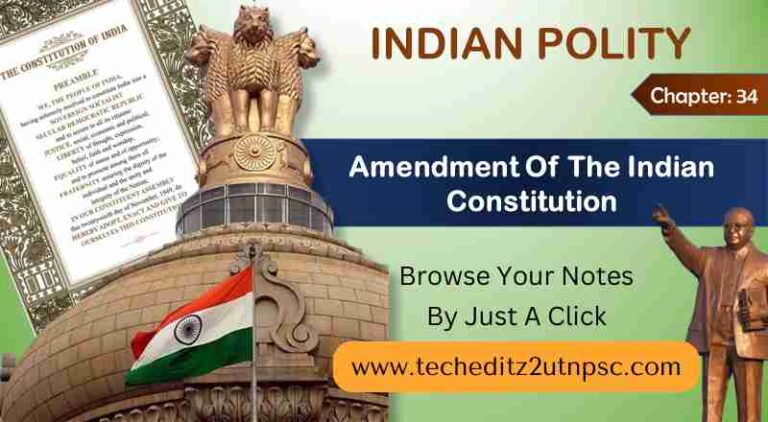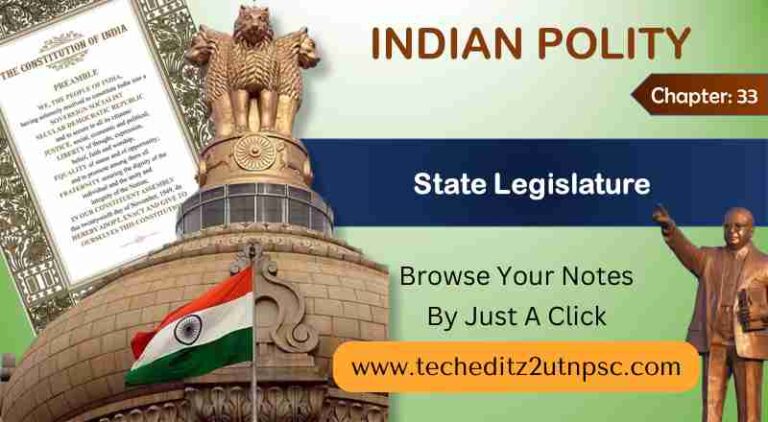support@techeditz2utnpsc.com | 8300-921-521

Union Public Service Commission
Indian Polity
Chapter 25: Union Public Service Commission
Union Public Service Commission: (Upsc)
- Article 315: There shall be a Public Service commission for the Union and Public service Commission for each state.
- UPSC is a Constitutional body.
- The UPSC conduct examinations for All India Services and other central services. What Are All India Services?
- These are the services recruited by the central government but, posted in the states and salary is also paid by the states.
How Many All India Services Are Present In India?
- There are 3 All India Services in India.
- IAS – Indian Administrative Service
- IPS – Indian Police Service
- IFS – Indian Forest Service Composition
- The UPSC consists of a chairman and some other members.
Appointment:
- The Chairman and other members are appointed by the President.
Strength (Number Of Members):
- The strength is decided by the President of India.
- In general the UPSC consists of 9 to 11 members including the Chairman.
- As on January 5th 2014 the strength is 11 including the chairman.
Qualifications:
- The qualifications are not prescribed by the Constitution.
- But, at least half of the members in UPSC should have held office for at least 10 years either under the Government of India OR Government of a state.
Conditions Of Service:
ADVERTISEMENT
- Decided by the President from time to time.
- The conditions of service should not be varied to their disadvantage.
Term:
- The Chairman or other members hold office for a term of 6 years Or Until they attain the age of 65 years, whichever is earlier.
- After completion of the term the Chairman or other membera, are not eligible for reappointment in the same position.
Resignation:
- The Chairman or members submit the resignation to the President of India.
Report Of Upsc:
- The UPSC submits the annual report to the President of India and the President places the report before the Parliament.
- The report of UPSC is discussed in the Parliament.
Removal:
- The President can remove the chairman or any other member of UPSC if
- The Chairman or member is adjusted as an insolvent or Engages during the term of office in any paid employment outside the duties of office
- or In the opinion of the President is not fit to continue in office by reason of infirmity of mind or body.
Removal On The Grounds Of Misbehavior:
What is misbehavior?
ADVERTISEMENT
- If the Chairman or member is concerned or interested in any contract or agreement made by the government of India or government of a state or If the Chairman or member participates in any way in the profit of such contract or agreement or in any benefit there from otherwise than as a member and in common with other members of an incorporated company.
- The President can also remove the Chairman or a member of UPSC for misbehavior.
- In the case of misbehavior the President has to refer the matter to the Supreme Court for an enquiry.
- The President can remove the Chairman or member on the advice that is tendered by the Supreme Court.
- The advice tendered (given) by the Supreme Court is binding on the President.
- During the course of enquiry the President can suspend the Chairman or the member.
After Retirement:
- The Chairman of UPSC after retirement is not eligible for further employment under the government of India or government of a state.
- A member of UPSC after retirement is eligible for appointment as the Chairman of UPSC.
- A member of UPSC after retirement is eligible for appointment as the Chairman of a Joint Public Service Commission or State Public Service Commission (provided the he has not attained the age of 62 years)
Functions Of Upsc:
- The UPSC conducts the examinations for appointments to the all-India services, central services and Public services of the centrally administered territories.
- The UPSC assists the states if requested by two or more states in framing and operating schemes of joint recruitment for ant services for which candidates possessing special qualification are required.
- The UPSC serves all the needs of a state on the request of the state governor and with the approval of the President.
- The UPSC is consulted on various matters related to
- Matters relating to the methods of recruitment to civil services and for civil posts.
- The principles to be followed in making appointments to civil services and posts and in making promotions and transfers from one service to the other. ( RDO (Group I) to IAS etc)
Recommendations:
- The recommendations of UPSC are not binding but advisory in nature.
Visit Our YouTube Channel For More Free Videos: Click Here


